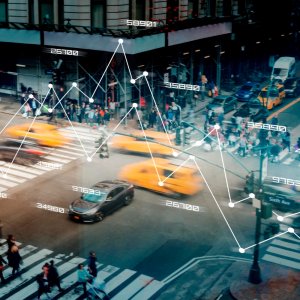Efficient Data Centers Key for Smart City Sustainability

STORY INLINE POST
Increasingly connected and “smarter” cities call for faster, more reliable and capable data centers that can handle and process large amounts of information. But the large carbon footprint that these centers produce can challenge the sustainability of a Smart City in the long run. “Cooling systems are the largest power-consuming part of data centers,” says Miguel González, General Manager Mexico at Vertiv. “But through innovative thermal solutions we offer systems that deliver the exact amount of cooling that each center needs to run safely and efficiently.”
González points out that the energy savings that Vertiv’s Energy Efficiency as a Service solution offers can help clients pay for the infrastructure that the company installs in its data centers. “We are a technology company, so rather than manufacturing and selling products, we focus on developing solutions,” he points out. “Our main strength is that we can design data centers and deliver flexible and scalable solutions for this sector.”
As a company that has traditionally served the telecom sector, Vertiv sees a promising future in the short term. According to González, the company went through hard times because the Telecommunications Reform of 2014 caused major uncertainty and several telecom service providers put their infrastructure investment projects on standby. “But these companies are starting to ramp up operations again and I am optimistic that Vertiv will achieve significant growth in the next couple of years,” he highlights.
González adds that the telecom and infrastructure sectors will play a key role in Vertiv’s growth as they will offer a lot of opportunities for companies in Mexico. He says Latin America has become an important global player for Vertiv’s solutions. “Companies are interested in achieving edge computing by bringing servers closer to clients to avoid signal delays and latency,” says González. “In Mexico, however, Vertiv faces several challenges because the country is in the middle point between the US and the rest of Latin America.” He points out that Mexico is so close to the US that data center companies do not place their servers in the country because their largest data centers are located in the US.
Despite this issue, González says Mexico offers several opportunities for Vertiv as telecom service providers such as AT&T, Telmex, Alestra and Telefónica invest in the country and the company explores the retail and manufacturing industries. “We want to diversify our business portfolio to support these companies,” he adds. “For instance, automotive companies continue to open assembly plants in Mexico and we have solutions that cater for them.”
In the case of Mexico’s manufacturing industry, González underlines that the need for automotive companies to digitize their operations to implement Industry 4.0 practices and take advantage of IoT has created a demand for the edge computing solutions that Vertiv offers. “These clients need quick access to information and a local backup of that information. Edge computing plays a key role in that,” he says. González underlines that information enables automotive suppliers to coordinate throughout the supply chain to achieve JIT logistics and manufacturing processes. “Edge computing ensures flexibility, reliability and productivity in operations and offers a better cost-benefit by reducing the need to invest so much in raw materials,” he adds.
It is a similar case in the retail sector. González says just as edge computing enables automotive companies to remain close to their partners, big supermarkets are interested in remaining close to their clients and understanding people’s consumer profiles. “They are reconsidering their business models and making investments in digitalization including data centers, data analytics and edge computing to that end,” he says. At the same time, González says Vertiv can help retail chains increase their energy-efficiency and reduce their CO2 footprint. “The retail sector accounts for around three percent of the country’s power consumption,” he says. “Vertiv offers a portfolio of solutions for these companies that can help them reduce their energy costs.”
























